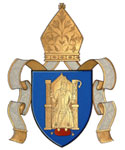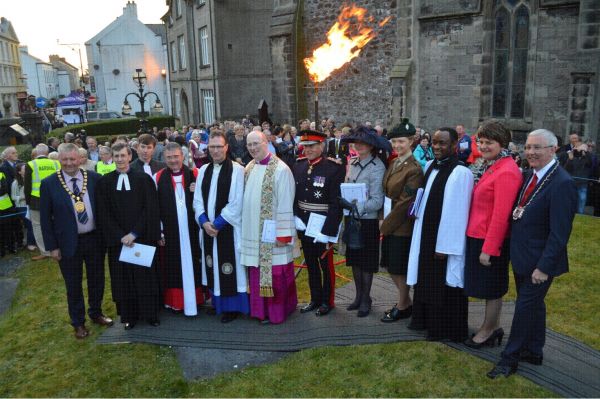 |
 |
News
Service of Thanksgiving to celebrate the Queen's 90th birthday

Pictured above: Lord & Lady Brookeborough and Arlene Foster, First Minister, with clergy and Rotary Club representatives gathered around the beacon after the Service of Thanksgiving
Sermon preached by the Rt Revd John McDowell, Bishop of Clogher at a Service of Thanksgiving to celebrate the 90th birthday of Her Majesty Queen Elizabeth the Second in St Macartin's Cathedral, Enniskillen on Thursday 21st April 2016:
It may seem as though I am stating the obvious, but it will do no harm to say plainly the reason why so many of us are so happily gathered here today. We are here to thank Almighty God for the long life of Her Majesty the Queen. And I would suggest that the principal reason we can do so as a joy and not merely as a duty, is because, throughout her long life, the Queen has lived as a subject of the Kingdom of God - in the words of the reading from S. Mark's Gospel, she has rendered unto God the things that are God's; that is the tribute of her whole life and personality, surrendered in countless acts of duty, responsibility and love.
Early in 1926 the Queen's mother, then Duchess of York began to make arrangements in earnest for the birth of her first child. She made sure that the maternity nurse who had cared for her own sisters when they were expecting babies would come to help her at the beginning of April. She was a woman called Anne Beevers 'tall and dark and very Yorkshire' as she later recalled. In the letter she wrote asking Mrs Beevers to come in April, she also asked her to recommend a tonic 'as I get rather tired (and irritable I fear)'.
She and her husband had hoped to rent a house in Grosvenor Square where the baby would be born and could spend the summer but the plan fell through in March, so the Duke and Duchess went instead to the Duchess's parent's house, 17 Bruton Street, off Picadilly.
By the middle of March the Duchess's medical advisor Sir Bertrand Dawson had decided that the baby should be induced and after discussing it with the Duke and Duchess he also motored up to Windsor to tell King George and Queen Mary. Contrary to the picture, which can so easily be given of rather remote and emotionally, buttoned up parents, they wrote immediately to the Duke and Duchess.
Queen Mary desperately wanted to be with her daughter-in-law but knew that if she went the Press would think that something was wrong and that the exaggerated reports would add unneeded stress to an already stressful situation. Unfortunately the Duchess's own mother, Lady Strathmore had a very high temperature and was confined at home in Scotland, so instead some friends were asked to come at the time of the delivery. As Queen Mary wrote, 'Someone who has had a baby and knows is such a comfort to one at such moments'. No husbands hanging around delivery rooms in those days.
As though that wasn't bad enough the Duke of York (who had become very anxious as first time fathers often are) had also to look after a member of the Cabinet, William Joynson-Hicks. He had been summoned in accordance with the convention that the Home Secretary should be present at the birth of a child in the direct royal succession to ensure that no substitution was made. It can't have been much fun for the The Queen' father, as Joynson-Hicks was a rather pompous authoritarian figure, known in the country as 'Jix' and in the Conservative Party as 'Mussolini Minor'.
Shortly after her birth an official announcement was made that 'The Duchess of York has had some rest after arrival of her daughter. Her Royal Highness and the infant Princess are making very satisfactory progress'. The announcement went on to say that, '...previous to the Confinement a consultation took place at which [it was decided] that a certain line of treatment should be adopted'. A euphemism for a Caesarian section. The new arrival was the King's first granddaughter and third in line to the throne after the Prince of Wales and the Duke of York.
That King and Queen were woken up at 4.00am to be told the news to their very great relief and drove down from Windsor to Bruton Street in the afternoon. Queen Mary recorded in her diary 'Saw the baby who is a little darling with a lovely complexion and pretty fair hair'. A day or two later she wrote to her son, 'I am thankful that all is going well with our darling Elizabeth and that adorable little daughter of yours (as yet they hadn't decided on a name), she is so sweet and pretty and I feel very proud of my first granddaughter'.
The Duke of York wrote in reply 'You don't know what a tremendous joy it is to Elizabeth and me to have our little girl.....now that we have our daughter it seems so wonderful and strange....I know Elizabeth wanted a daughter. May I say I hope you don't spoil her when she gets a bit older'. They decided to name the little girl Elizabeth Alexandra Mary after her mother, great grandmother and grandmother.
So there you have, in more or less the words of her own family, the story of the birth of a little girl, con doubt into a life of some privilege, but with absolutely no premonition that it would also be a life of relentless duty as Queen. And perhaps in that way Providence provided wisely, because what emerges from that record is the picture of a close, loving family, taking care to express their love in little acts of thoughtfulness and affection. It also meant that the future Queen's character could be formed during her childhood, when the wax was still soft, within a fairly ordinary family setting by an optimistic, charming, life enhancing mother and by a shy, shrewd, devoted and courageous father. All of which qualities combined in her own unique personality and have given such depth and texture to the Queen's life of duty and affection ever since.
But if I could return to what I said at the beginning of this sermon; that her life of duty to the State, and love and affection for the country have been possible only because they have been worked out as part of the Queen's discipleship of Jesus Christ.
Because that discipleship was formed and has been lived in a very particular religious environment (that of the Church of England) it is characterised by a certain reserve and desire for toleration and inclusiveness. It is not a very showy expression of faith, but it obviously runs very deep, and it is no less an authentic form of discipleship than those which are more ardently expressed.
There is a character in Thomas Hardy's novel Far from the Madding Crowd who says, 'There is this to be said for the Church [of England], a man can belong to the Church and bide in his cheerful old inn, and never trouble or worry his mind about doctrine at all'. Now, that is something of a caricature but there is a good deal of truth in it to make it work. True that a life of Christian devotion and duty - of rendering unto God the things that are his, that is, our whole selves - has room in it for the odd gin and Dubonnet and pale ale and smiles when a horse wins at Ascot or (and I find this hard to say) when England win at cricket, just as it has for sitting with Secretaries day after relentless day poring over correspondence, or with almost superhuman tact and wisdom steering her way through the weary maze of political life or attending to those many duties that fill the Court Circular of the Daily Telegraph.
It seems to me at any rate, that Her Majesty the Queen has understood what many people (including many religious people) fail to grasp, that all life is God's, and that it is the manner that we do the ordinary things of life, which is a true discipleship. It is not everything that has to be said about the Christian Faith, and it presupposes a trust in Him, but it is a great deal.
In finishing if I may use those quaint old words from 1662 The Litany of the Book of Common Prayer; today we give thanks to God that it has pleased Him to guard and bless His servant Elizabeth our most gracious Queen and Governor these 90 years and to have ruled her heart in His faith, fear and love; and we pray that she may evermore have affiance in Him, and ever seek His honour and glory as long as she shall live. Vivat Regina. Long live the Queen.
+John Clogher